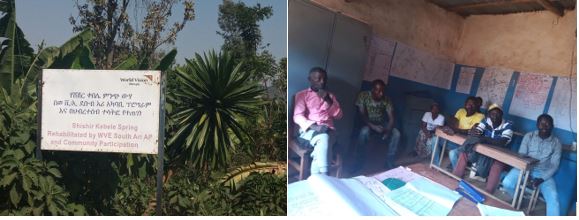Lessons captured during a learning exchange visit to IRC partner districts in Ethiopia.
Published on: 23/03/2023
IRC WASH supports the Sustainable WASH Program Woredas (Districts) in Amhara region (based on funding provided by the Conrad N. Hilton Foundation) as well as South Ari Woreda of SNNPR to strengthen their WASH systems. the implementation in the two areas, we drew various lessons depending upon the nature of the projects. We found that an experience sharing visit between the two implementation areas (three SWP woredas and South Ari woreda) would be vital and therefore recently organised a learning exchange visit between the two implementation areas. I have captured the following main lessons from our visit to South Ari Woreda.

Shishir Kebele WASH Federation committee meeting with the visiting team. Phot by Girmachew Addisu
About a decade ago, the SNNP Regional Council formulated a regulation on the establishment of kebele level service provider institutions, i.e., federations to bridge woreda service authorities with scheme level service providers such as WASH committee (WASHCO) and Water User Associations (WUAs) which are the scheme level management and WASH governance structures. A federation is a kebele level rural WASH service provider based at the kebele centre in which members are selected from each WASHCO or WUA and from each water scheme. The main function of the federation is to support WASHCOs and WUAs through reporting on the functionality status of the scheme and the financial flow to the Woreda Water and Energy office every month. They also facilitate maintenance by providing monitoring information to the woreda water technician and private maintenance service providers through phone calls. When there is any issue coming from the WUAs, the federation pays for the transport cost of the maintenance crew and users pay for the spare part as well as for the technician. This serves as a reminder that even in the absence of a well-established (Monitoring Information System (MIS), a call to a maintenance expert can keep the water flowing. This is how the WASH services are provided with the assistance of local level monitoring systems.
In South Ari, all schemes have Water User Associations and each WUA is a member of the federation. The federation meets twice a month and WUAs together with the federation meet once a month, main discussion agenda points were about the status of each scheme, tariff collection, issues, resources in each account for any operation, maintenance, and scheme management. For the federation to continue as a local level institution each WASHCO and WUA contribute 50 ETB per month, but that is too little to fulfil its functions, the federation members said.
‘’ If water users contribute to the construction, operation, and maintenance on a regular basis and in sufficient amounts, water will flow for the design period of the scheme and can be replaced when outdated. We are happy here to be members of the water user federation on a voluntary basis, but the challenge is that the tariff collected from members is not enough and inconsistent.’’ Yekmie Jimelko, chair of the Shishir Kebele Water User Federation, South Ari Woreda in SNNP, Ethiopia.
Maedenew Birhan, Farta Woreda Water and Energy Office Head said, ‘’aha, that is awesome to get functionality reporting on a monthly basis from each kebele including the financial flows of each WUAs which can help to maintain the schemes on time’’.
He also suggested setting up a mechanism to establish a cluster of WUAs to get regular reports from each kebele by designing scheme level reporting formats.
The Amhara region used a different approach in establishing service providers at local level, particularly for rural WASH services. In Farta Woreda, there is a scheme-level WASHCO. Once it is legalised, they can establish a WUA by bringing 3-5 nearby schemes together and electing WUA members from each WASHCO. In terms of responsibility, it is almost the same as South Ari, except that the WUA in Farta is not a kebele level service provider, instead, it is a village level institution and does not cover the whole kebele unless all WASHCOs become legalised and establish their WUAs with the help of the nearby WASHCOs. Therefore, there is no kebele level reporting and maintenance facilitation for the woreda. In fact, Farta Woreda has a strong WASH coordination at woreda level, regular steering and technical committee meetings, joint planning and monitoring mechanisms are in place. Yohannes Melti, South Ari Woreda Water and Energy Office Head, during his visit to Farta Woreda appreciated the woreda level WASH sector office coordination.
The main challenges the federations face, as mentioned during the discussion, were not being able to collect tariff regularly, the amount of finance in each WUA account being low, the monthly tariff amount is determined by the community and sometimes they are not willing to pay. Not having access to fairly priced spare parts for timely maintenance is also a challenge. Moreover, the kebele federation needs sustainable financial support from WUAs through a monthly contribution, but that is not enough for the federation to fulfil its responsibilities. Possible solutions to these challenges include the need for the Woreda Water and Energy Office to support the estimation of tariffs and raising community awareness. WASHCOs and WUAs should have enough financial resources to sustain the scheme management, consult and support spare part suppliers, and support the federation in connecting the suppliers with the water technicians for maintenance.
From our visit, we learned that well-established and functional local level service providers, local institutions, and finance and monitoring are the most important building blocks that can keep the services running.
At IRC we have strong opinions and we value honest and frank discussion, so you won't be surprised to hear that not all the opinions on this site represent our official policy.